
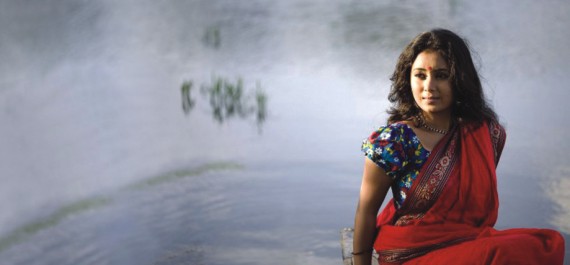
Reviewed by Raida Kifait Reza
Love stories have this unidentified power of tearing up one's eyes, and no matter what the language is people get drawn towards it. It is very hard to find a romantic Bengali movie that you would love to see, and 'Monpura' is one of those hard to find movies. The movie was made by Gias Uddin Selim and depicted by Kamrul Hasan Khoshru. It was premiered in Balaka Cinema Hall on the 13th of February. The movie has already become a hit, along with the soundtrack, which can be pretty much heard on every radio station. The movie has a story of the real Bangladesh blended with a touch of a great love story!
Monpura ia a story of Sonai and Pori who fall in love at the first sight. Sonai (acted by Chanchal Chowdhury) is the housekeeper of the Gazi family, and he was there since he was a child. He was sent to an island to cover up the blame of a murder by Gazi's son (Monir Hossain Khan Shimul) who is mentally ill. After a long time of solitude and isolation, a fisherman comes to the island to catch fish, along with his daughter Pori (acted by Farhana Mili). Their love affair was soon to be held back by obstacles as Pori got caught sneaking off to meet Sonai by her father. Misfortune fuelled the situation as Gazi went to Pori's father to ask for her hand for his son, as the 'pir baba' said it would heal his mental condition.
The story goes along as the lovers fight for their love, and meet a heartbreaking end. The movie was a success towards making the audience tearful. The songs have been successful in making the movie more engaging and lively, and managed to make the crowd get into the movie deeply. Shayan Chowdhury Arnob is of one the music directors in the movie so it is not a surprise the songs show such promise in the movie.
The shooting of the movie started on June 2007, and went through a lot of problems as it was the rainy season. The movie had to be made, and so the director decided to take the risk and go on.

The camera work and the characterization was another enticing part of the movie. The location was successful in showing the real Bangla country in all its beauty and the amazing scenery of the lakes and islands of our country. After a very long time a Bangla movie has shown extraordinary promise which can bring a revolution to the ways things have going on in Dhalywood!

By: Sabhanaz Rashid Diya
Photos: Zabir Hasan
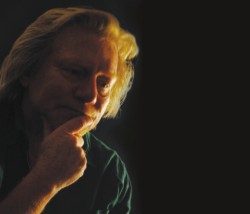 I am sometimes intimidated by interviews. The people I meet are frequently those that have made a significant contribution in their respective fields and are of such high stature that I almost feel patronized. I was once taught by a friend when I am interviewing, I am no less capable than my interviewee, simply because we don't come from the same profession. Here I am, on one end as a reporter and the person on the other end has voluntarily agreed to answer my nagging. There really was nothing to be frightened of. I think that's why we've come such a long way.
I am sometimes intimidated by interviews. The people I meet are frequently those that have made a significant contribution in their respective fields and are of such high stature that I almost feel patronized. I was once taught by a friend when I am interviewing, I am no less capable than my interviewee, simply because we don't come from the same profession. Here I am, on one end as a reporter and the person on the other end has voluntarily agreed to answer my nagging. There really was nothing to be frightened of. I think that's why we've come such a long way.
Over the past month, I took the highest number of interviews at a stretch in my writing career till date, courtesy of Chobi Mela V. The experience was one of that most rewarding in my life and it would be an understatement to precisely explain the lengths I have learnt through these conversations. While the individuals I have come across are indeed the finest photographers and artists in the world today, they are also surprisingly the most friendly and modest people I have known.
Morten Krogvold happens to be one such individual. One of the twelve Hasselblad Masters of 2002, this Norwegian portraitist is currently the Artistic Director of the Nordic Light International Photo Festival. His works have been exhibited worldwide and he is considered as one of the top photography icons of today. It was natural for me to feel intimidated before interviewing someone of his caliber; but much to my surprise, Krogvold in person, was everything but intimidating. On the contrary, he was friendly and lovable, almost to the extent you can perceive him 'fatherly' and made everyone feel at home and on their feet in his presence.
I met him on a late January evening at Pathshala, the South Asian Institute of Photography where he was conducting a workshop on 'Photography Aesthetics' amongst the students. He came with a warm grin to meet me, and apologized for being a bit late because of the typical Dhaka traffic. He laughingly mentioned how he has calculated that Hasib Zakaria from Pathshala has probably spent five years from his thirty years of life being stuck in traffic congestion! The very idea sounded ridiculous, but was unfortunately, true when one sums up the hours we spend on the road. He insisted I stop thinking he's 100 years old, since apparently, my body language indicated I was very frightened he might just drop on the floor as a result of old age. Nonetheless, sitting across Morten Krogvold and talking, while sipping black coffee was perhaps one of the most rewarding experiences of my life.
RS: You've been to Bangladesh on several occasions. What do you feel about being here and Dhaka?
MK: Well, it's been a lot of changes since the first time I've been here, which was in 1996. I call it a 'terrible beauty'. The combination of the traffic and poverty, with that of the beautiful smiles of the people around you is really what attracts me and makes me come back every year. It's wonderful how Bangladesh has secured the place in my heart because of its people.
RS: You're here this time to conduct a workshop amongst Pathshala students, and have seen their works. What would you say about the quality?
MK: We do have some brilliant, top notch photographers from Bangladesh who are exhibiting their work internationally. However, these students are all bright, but have a tendency of making excuses. I don't allow excuses. We have made progress through the workshop, but I believe that the digital revolution has created an opportunity for laziness. You can click and click, and go back home to select one good photo out of a hundred. I've always worked in film and 90 percent of the world class photographers continue working in film because it creates a pressure to limit yourself to quality and make a statement. With the digital cameras, people think it's too easy. You can go down to a slum here and do what a trained monkey with a digital colour camera can also do. They don't pick their subjects, but when I push them, they break out of their shells and produce good work. I think these students love to be pushed!
RS: So, do you think because of the digital revolution, there is an abundance of photographers? Is that a good thing or a bad thing?
MK: It's both. The good thing is that families can take photographs. The bad thing is that they store in their computers. Photographs are meant to be in print and not stored in a CD. Photography is a craft and as a result of the digital revolution, people think it's too easy, which is not true. There is also a dependency on Photoshop, which I think just creates laziness. However, the best thing about the digital revolution is that you can shoot photographs at night in colour which is very difficult in black-and-white film. The thing about technology is that it should not create dependency. You can use it to your advantage, but shouldn't spend 3 to 4 hours a day on it. I love the technology, but I think people misuse it. A digital camera can never create good photographs; it comes from the heart.
RS: What would your advice be to young, aspiring photographers who will be reading our conversation?
MK: The first thing I will suggest is that they go to the dark room and start working in film. Working in film is a learning process. Of course, you can switch to digital, but try learning the analogue stuff first. The next thing you need to do is work hard and be dedicated. The world doesn't need more photographers; it needs doctors, bus drivers and nurses. If you're a photography student and are in doubt of whether you want to go in that direction, then don't pursue photography as a career. You need to be certain and give your 100 percent dedication to the field. Then, photography is about meeting people and being polite to them. The most important tool behind the camera is a smile. You need to read good books, watch quality movies and study art history. My best advice to the young would be to spend less time being dependent on technology. The Internet is a good thing as long as you're using it for an hour every day. However, when you over do it, you're wasting valuable time. I know it because I've seen it. You're 22 or 23, and suddenly, you're in your 50s. Forget the camera and learn the technique. Try to find your own voice in photography and show the world what you have in Bangladesh. I often ask my students what they would do in photography if they knew they wouldn't fail, what would they do to find their own voice. Most importantly, you need to forget all excuses!
Chobi Mela V officially ends tomorrow in all its grandeur. It's been one heck of an experience. The exhibitions have been swell and so have been the many artists who made the festival a memorable celebration. 'Freedom' has been indeed been redefined. If you haven't taken a peek into the galleries yet, you've still got today. Trust me, it's worth your time!

1. The colour of heaven is red.
2. When I was small, I always wanted to be a footballer.
3. I would like to be reborn as me.
4. I indulge in being more at home. I travel so much!
5. I will die, but I will not leave my children and wife.
6. Roses are red, violets are blue, and the world cannot be understood.
7. My best quality is I am nice to people.
8. I think I will use more time with experimenting.
9. The first thing I do when I wake up in the morning is thank the Lord I am still alive.
10. Music makes me feel sad in a good way.
11. To be, God is nature and art.
12. To me, beauty is melancholy.
13. My worst quality is lack of structure.
14. The cup is always half of red wine.
15. The first piece of art that mesmerized me was Roman Vishniac's 'The Only Flowers of Her Youth', 1938
16. When a perfectly set up shot goes wrong, it gives you a lot of opportunities.
For more updates, visit: cmpicklette.wordpress.com
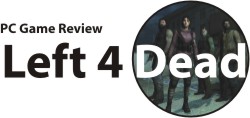
Le Chupacabra
Click, Click, Click.
What, three shots and they're dead? Now hold on just a moment. I've seen George 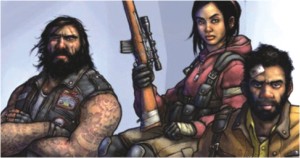 Romero's zombie films as well as recent stuff like 28 Days/Weeks Later. I swear that it takes a hell of a lot more to kill the undead. I want to scream, lash out and spray my entire clip into the horde, cackling all the way as I'm dragged down beneath a seething mass of corpses intent on feasting on my delicious innards.
Romero's zombie films as well as recent stuff like 28 Days/Weeks Later. I swear that it takes a hell of a lot more to kill the undead. I want to scream, lash out and spray my entire clip into the horde, cackling all the way as I'm dragged down beneath a seething mass of corpses intent on feasting on my delicious innards.
No, instead I can easily find myself counting the shots under my breath, probably even letting my eyes twitch with each one. Nothing must be wasted, I feel. Why? Because that would be utterly pointless. I've got limited ammo anyway and once you hit that n number of zombies where n/3 exceeds your clip size, then there's cause for much pain. And panic. Except not really. See, I have a pistol. Therefore, I switch to that pistol and then splatter some more heads. Out of pistol ammo? Well then I have an empty rifle - with a pointed muzzle. It's easy to hit them with it until they stop twitching. I've now officially undeaded the undead.
Looking at my partners, I wonder why one of them is patching the other guy up whilst he's making homoerotic noises. It's a bandage. It stops you from bleeding. It's not supposed to cause you pleasure. In between face palming myself and wondering how this game ever managed to get lathered with praise, I wearily looked around the next corner. It's dark, obviously. And yet you can see silhouettes of more shuffling cadavers. Wait, how does that work? It's like they're darker than pitch black, which shouldn't be possible. Is there a racist joke in there somehow? Perhaps if I ask my Afro-American teammate, Louis, to go forward and commune with those swaying shapes, something might come of it. Perhaps the zombies will call off this pointless manslaughter. As in, they'll back off so we can stop slaughtering them.
Ah, no. There he comes running back with his buddies. Oh, wait... they're not his buddies, I remember, and then begin applying point-and-click click-and-point tactics. One. Two. Three. Four. Five. (Once I caught a fish alive). Okay, time to move on now.
So now we're at a red door: a safety room. Once everyone enters, the screen fades away and loads the next area. If you're clever you'll remember to grab every med kit in sight and then load up on ammo before the aforementioned fading begins. Y'know, so you can help out your teammates when they need it. Actually, I was on 80 health, which can't be good. Time to heal. Ahhh. Wait-a-minute, old man Bill had only 50. Should'ave healed him first. Sorry, buddy.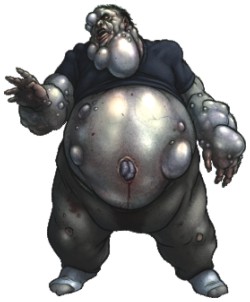
This time, armed with a shotgun, I opened the door and ventured forth. It's a darker area than before and empty. A bit further and it's still empty. Okay, now that's unsettling. We've been tripping over zombies left and right and now, they're avoiding us? Just to be safe, I snap my view behind my team, just curious to see if we're not being followed or anything. Nope, nothing.
Suddenly a prompt pops up asking if I would like the difficulty to be raised. Sure, why not? You've got buckshot to spare. With the difficulty upped, we keep creeping forward. Slowly, a childlike sobbing fills the air, echoing off the concrete walls. Like a siren it dips and rises, rending at our hearts. Perhaps this was a side to the game that I hadn't heard of; perhaps it was time to rescue someone. Intrigued, I ran forward into the darkness. Soon I could make out a small shape on the ground, huddled with fear, shaking. Turning on my flashlight, I try to see how I can help the little girl...
... and my face is lanced with bloody claws, vision filled with rotting skin and eardrums bursting with shrill screams.
[Chupakun has startled the Witch] the game reveals.
As I'm wrathfully pounced on by this potentially scorned woman (perhaps zombie culture has its own unique internal politics - definitely worth future study), I realise that for the first time that my bullets aren't killing. I know I've fired more than three into that thing.
This is worrying.
In the distance, I can hear my team-mates shouting all around me, shooting at the Witch, trying to pry her off and can only watch in horror as my vitality begins to plummet. However, with great effort the team manages to kill the hellish thing. Macho biker Francis is now healing me as I sheepishly look on, feeling a little guilty. I could have just as easily healed myself and saved his med kit had I not used mine before. My nervous laughter is suddenly drowned by gunfire. Before the team have had a chance to chat about the Witch, we're besieged on all sides by a horde. And this time, I feel a pinprick of nervousness, of vulnerability. I almost died last time and it could happen again. Suddenly, there's a weight to each bullet.
With the smoke cleared and all the zombies killed I can finally share in that magic moment with your team. We truly worked together to stay alive so far. All of a sudden, I felt fonder of Louis' quips, of Bill's grumbling and even of Francis' negative attitude. He's actually a sweetie underneath all those tattoos.
With greater flourish, we moved forward again as a team. More zombies downed and everyone's chatting with each other, relishing each set piece and comparing accomplishments. And as we near the end, the very earth starts rumbling. Ominous bass plays through the speakers as a giant mass of muscle roars into the screen and with one massive punch, sends me flying.
As I soar through the air, I think of only one thing: damn, this is awesome!
